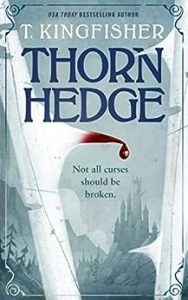Gary K. Wolfe Reviews Thornhedge by T. Kingfisher
 Thornhedge, T. Kingfisher (Tor 978-1-250-24409-3, 128pp., $19.00, hc) August 2023.
Thornhedge, T. Kingfisher (Tor 978-1-250-24409-3, 128pp., $19.00, hc) August 2023.
A few months ago, in reviewing Kelly Link’s White Cat, Black Dog, I made the thoroughly unoriginal observation that fairy tales seem almost infinitely malleable, and almost irresistible to fantasy writers; it’s as though they were the base pairs that make up the very DNA of a lot of Western storytelling. In the last year or so alone, I’ve looked at creative and sometimes brilliant improvisations and variations from Link, Jane Yolen, Theodora Goss, Alix E. Harrow, Catherynne M. Valente, and even Gene Wolfe. I mention this because, even in such august company, T. Kingfisher’s Thornhedge stands out as a strikingly original take on the Sleeping Beauty tale, based on a central reversal that I, for one, hadn’t seen before. In deference to the spoiler-sensitive, I’ll only mention a couple of questions that most readers will find themselves asking early on: exactly what is that forbidding hedge of thorns around the castle keep really for, and why is the fairy changeling Toadling so devoted to keeping it secret that she maintains a lonely vigil for centuries? By the time we learn the answers, we’re so thoroughly invested in Toadling’s own story, and her cautious relationship with a peripatetic and not very heroic knight named Hamil, that the real focus of the novella becomes clear. And while it does eventually involve some brutal murders, suicide, abandonment, and hideously reanimated corpses, it’s finally a sweet-tempered tale of loyalty, patience, honor, redemption, and love.
The opening chapter not only serves as a remarkable evocation of loneliness, but establishes the story in that liminal space (see, there I go again) between fairytale lore and actual medieval history. Toadling, with her greenish skin and frog-like face – and the habit of actually turning into a toad in moments of stress – has been keeping watch over the thornhedge for so long that she suspects generations of humans must have passed, leaving the actual tale of what happened there transformed into legend. She marks the passage of time by noting the shifting bird populations, a road being built nearby, and the fluctuating numbers of humans who appear. At one point, when travelers have all but disappeared, she sees what we recognize as plague doctors and bands of flagellants, and when the knight Halim shows up much later, he explains that the plague has been over for two centuries. With his references to the Pope, the Byzantine-Seljuk wars, and his own Muslim background, he also yanks the story more firmly into history. Though he describes himself as neither a very good knight nor a very devout Muslim, he proves to be unfailingly polite and considerate, convincing himself that Toadling may herself be the one under an enchantment, and determines to rescue her.
Meanwhile, Toadling recalls the now-ancient story of the princess in the tower, and why she blames herself for her present dilemma. What begins as a rather innocent comedy of errors briefly turns into a gruesome horror tale, then into a melancholy, almost elegiac account of loss and abandonment as everyone remaining in the castle either dies or wanders off, and finally into that long lonely vigil that first introduced us to Toadling. That may sound like a lot to pack into a relatively short novella, but Thornhedge is actually a masterful demonstration of what novellas do best: focusing largely on a single individual facing an apparently insurmountable dilemma while trying to find a place in the world. Puzzled by a human world she has never belonged to, and yet never fully at home among the fairies, Toadling is one of the more endearing and memorable characters I’ve encountered this year, and pretty much the same can be said for her tale.
Gary K. Wolfe is Emeritus Professor of Humanities at Roosevelt University and a reviewer for Locus magazine since 1991. His reviews have been collected in Soundings (BSFA Award 2006; Hugo nominee), Bearings (Hugo nominee 2011), and Sightings (2011), and his Evaporating Genres: Essays on Fantastic Literature (Wesleyan) received the Locus Award in 2012. Earlier books include The Known and the Unknown: The Iconography of Science Fiction (Eaton Award, 1981), Harlan Ellison: The Edge of Forever (with Ellen Weil, 2002), and David Lindsay (1982). For the Library of America, he edited American Science Fiction: Nine Classic Novels of the 1950s in 2012, with a similar set for the 1960s forthcoming. He has received the Pilgrim Award from the Science Fiction Research Association, the Distinguished Scholarship Award from the International Association for the Fantastic in the Arts, and a Special World Fantasy Award for criticism. His 24-lecture series How Great Science Fiction Works appeared from The Great Courses in 2016. He has received six Hugo nominations, two for his reviews collections and four for The Coode Street Podcast, which he has co-hosted with Jonathan Strahan for more than 300 episodes. He lives in Chicago.
This review and more like it in the August 2023 issue of Locus.
 While you are here, please take a moment to support Locus with a one-time or recurring donation. We rely on reader donations to keep the magazine and site going, and would like to keep the site paywall free, but WE NEED YOUR FINANCIAL SUPPORT to continue quality coverage of the science fiction and fantasy field.
While you are here, please take a moment to support Locus with a one-time or recurring donation. We rely on reader donations to keep the magazine and site going, and would like to keep the site paywall free, but WE NEED YOUR FINANCIAL SUPPORT to continue quality coverage of the science fiction and fantasy field.
©Locus Magazine. Copyrighted material may not be republished without permission of LSFF.






